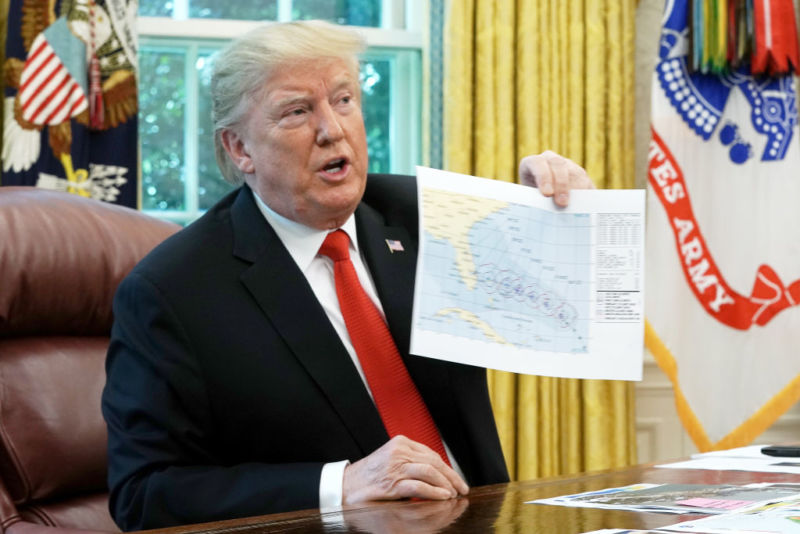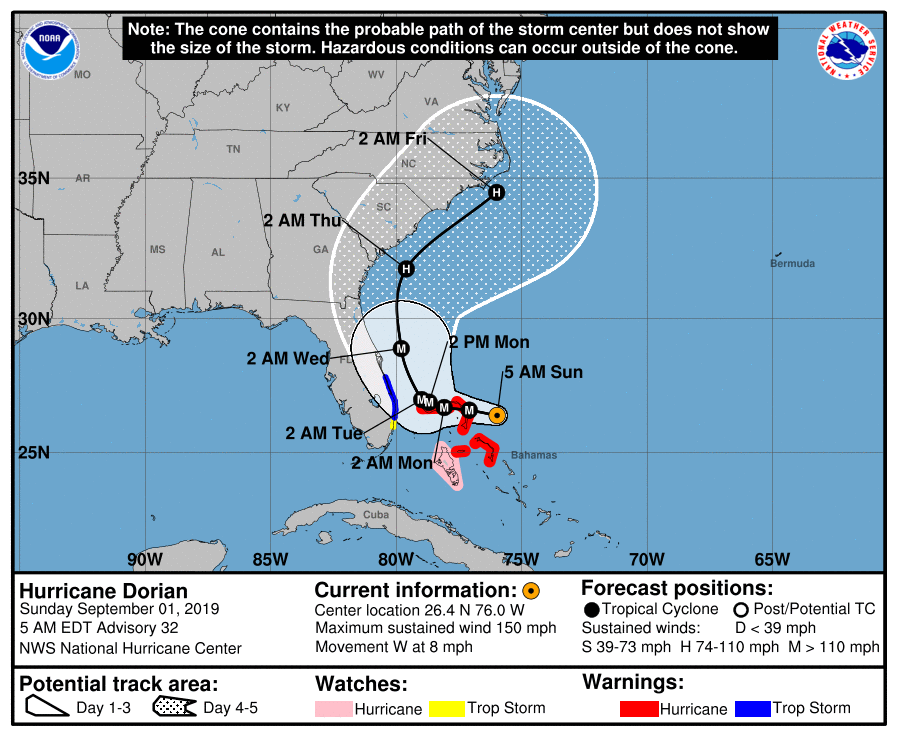Trump tempest –
“I will do everything I can to support you and support your critical mission.”
Matt Lanza –

Enlarge/President Donald Trump has continued to insist Alabama was threatened by Hurricane Dorian.
Chip Somodevilla / Getty Images
A soft-spoken, contrite , and at times emotional Neil Jacobs, acting head of the National Oceanic and Atmospheric Administration, addressed the annual meeting of the National Weather Association on Tuesday morning in Huntsville, Alabama. Intertwining anecdotes on his own career path with comments about Hurricane Dorian, Jacobs expressed his support for the National Weather Service in the wake of the storm. “Weather should not be a partisan issue,” Jacobs emphasized toward the end of his speech.
The weather community has been buffeted by a storm of its own following President Donald Trump’s insistence that his comments about Dorian threatening Alabama were valid ( althoughthey were not, and in fact were a distraction to forecasters),his doctoringof a forecast map, the issuance ofa questionable, unsigned statementfrom NOAA on Friday, and reports that Department of Commerce Secretary Wilbur Rossthreatened to firetop employees at NOAA after the agency’s Birmingham office contradicted President Trump’s claim.
“(Friday’s) statement did not say that we understand and fully support the good intent of the Birmingham office to calm fears and support public safety, “Jacobs said, adding he was proud of the work of all National Weather Service forecast offices. He also acted to reassure Weather Service employees that their jobs, and how they perform them, are not in jeopardy. “There is no pressure to change the way you communicate forecast risk into the future,” Jacobs noted.
Jacobs turned emotional near the end of his speech. “We’ve come a long way. This is hard for me. This is hard for my friends, and it’s hard for my family. I want to thank all the people who know me and have supported me,” Jacobs said. “I haven’t changed. I’m the same Neil I was last Thursday. I’m a modeler and a forecaster, and I will do everything I can to support you and support your critical mission to protect life and property for the American people, “
Jacobs added that he would be clearing his calendar to visit as many weather service offices as he can.
Throughout the speech, Jacobs emphasized how difficult hurricane forecasting is. He offered praise for the National Hurricane Center, which produced a five-day forecast that was 20% better than the average track error. He also added support for the NHC’s Storm Surge Unit, which he said made forecasts that allowed for a “surgical evacuation” in Dare County, North Carolina, and minimized evacuations in south Florida, despite the close proximity of the storm. Going forward, Jacobs said the lesson he has learned is that the weather service needs to be present in all Federal Emergency Management Association briefings during future storms. “This is critical if we are going to be analyzing forecast output. We need somebody who knows how to interpret forecasts,” Jacobs noted.
Dominating the meeting
Jacobs’ comments come a day after the director of the National Weather Service, Louis Uccellini, delivered an unambiguous, forceful defense of the response by forecasters in the Birmingham office to unfounded concerns over Labor Day weekend about Hurricane Dorian impacting Alabama. The two speeches at the annual weather gathering have helped clear the air a bit at an annual meeting typically heavily focused on science, research, and networking.
On Monday, Uccellini credited the Birmingham office for putting a stop to rumors in the wake of President Trump’s September 1 tweet, which included Alabama in a list of locations at risk of being “hit (much) harder than anticipated” by Dorian. At the time of the president’s tweet, Alabama was well outside the cone of uncertainty predicted by the National Hurricane Center, and forecasters expected no impacts of note in the state.

Official National Hurricane Center forecast for Dorian on Sunday morning, at the time of President Trump’s “Alabama” tweet.
National Hurricane Center
“Let me be clear, the Birmingham office did this to stop public panic, to ensure public safety, the same goal as all the National Weather Service offices were working toward at that time, “Uccellini said. He noted that the Birmingham office’s experience with prior events, includinga deadly spring tornadoin Lee County, Alabama, and lessons learned from physical and social science principles, informed their decision to respond. “The system worked as designed,” he said.
For those attending the conference in Huntsville, Uccellini’s comments, as well as those from Jacobs Tuesday morning, appear to have relieved a good bit of the tension that had been palpable up to that point. Typically, the annual meeting of the National Weather Association is about what one might expect from a conference of meteorologists. Attendees sit in on talks and view posters highlighting the latest in operational meteorology case studies and research. There is also an emphasis on students and networking, particularly this year with a meeting theme of paying it forward. Much of the week is spent catching up with friends and colleagues in the field. Birmingham broadcast meteorologist James Spann, who has also frequently offereda vigorous defenseof the NWS forecast office there, has referred to this meeting as a “family reunion” of sorts. From my perspective as an attendee, he is correct.
However, it has been difficult to have a conversation with anyone this week without at least touching on the Dorian controversy. My sense among the attendees I’ve spoken to, and those I have seen post on social media, is now a hope that the weather community can move forward and let the political battles play out in Washington. This is now the second major meteorology conference in 2019 to be significantly clouded by political news. Hundreds of federal government meteorologists were unable to attend the American Meteorological Society’s annual meeting in Phoenix in January because of the government shutdown.







GIPHY App Key not set. Please check settings